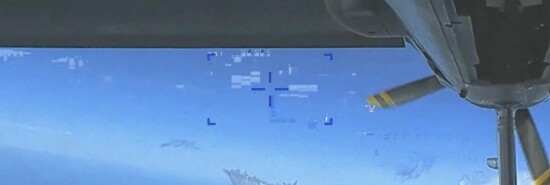
How and why the US must prevent Russia from downing more drones
Tom Rogan
Video Embed
Although it seems to have been accidental, Russia downed a U.S. Air Force MQ-9 Reaper drone operating in international airspace on Tuesday. The question: How to prevent a similar incident from occurring in the future?
The question needs answering. For a start, each MQ-9 costs approximately $18-$32 million.
PENTAGON’S BOOSTED MISSILE BUYS ARE INSUFFICIENT TO MEET CHINA’S THREAT
Tuesday’s loss occurred when two Su-27 Russian naval aviation or air force fighter jets intercepted the drone over the Black Sea. Dumping fuel into its flight path, the Russians evidently sought to disrupt the drone’s intelligence-gathering activities and harass its remote operators. One Russian pilot apparently then miscalculated and flew into the drone, forcing its operators to send it crashing into the Sea.
We can be confident, albeit not certain, that the downing was accidental.
After all, the risk to the Russians was significant. Had the Russians wanted to bring the drone down with surety, they could have simply fired upon it. Russian media reports, which should be judged with caution, claiming that the drone has been located at a depth of 800 meters. The U.S. insists it wiped the drone’s data core, but if they have located the drone, the Russians might be able to recover valuable intelligence related to its processing, imaging, and sensor systems.
Thus far, the Biden administration has dealt with this mini-crisis via diplomatic protests and warnings that it must not be repeated. The Russians, however, will likely view that response as timid.
While Vladimir Putin has no interest in a direct military conflict with the U.S. or NATO, he is a strategic opportunist who is willing to take risks. Amid rising statements of skepticism about the Biden administration’s Ukraine policy from the leading presumptive candidates to replace Biden, Donald Trump, and Ron DeSantis, Putin may regard Biden’s response here as an indication he is increasingly cautious over the war.
That U.S. P-8 Poseidon maritime surveillance aircraft appear to have kept within Romanian airspace during recent Black Sea operations may also fuel Putin’s sense that he can escalate. After all, the P-8s could presumably better accomplish their mission if they were actually flying over the Black Sea.
Still, the Biden administration cannot allow Russia to hold either a perceived or effective veto over U.S. military operations in international airspace. Doing so would undercut the central contention of U.S. operations in relation to the Taiwan Strait and the near entirety of the South China Sea, which China illegitimately claims as its own. Namely, that the U.S. will operate in international waters and airspace without being intimidated. If the U.S. now suspends these normally daily drone flights, it risks signaling unambiguous weakness to Moscow. The U.S. should instead keep calm and carry on.
The U.S. should send up more drones with the stated expectation Russia will not endanger their operations. If Russia then downs another drone, the U.S. can deploy fighter escorts to defend future drone flights. I have previously argued in favor of such action in response to dangerous Russian intercepts of manned U.S. aircraft over the Mediterranean Sea. But escorts are not unprecedented over the Black Sea.
Since the start of the war in Ukraine last February, the British air force has occasionally deployed Typhoon fighter jets to escort its manned RC-135W intelligence collection aircraft over the Black Sea. Like any U.S. fighter jets that would conduct escort activities, the Typhoons are significantly more advanced, and their pilots better trained than their Russian counterparts.
CLICK HERE TO READ MORE FROM THE WASHINGTON EXAMINER
Put simply, the Russians would be very unlikely to directly challenge these flights because doing so would put them at unacceptable risk. The political ramifications for Putin of an unsuccessful air-to-air engagement between a U.S. and Russian jet, especially in proximity to Crimea, would be very problematic.
Put simply, the U.S. should continue doing what it’s doing. Russia cannot be allowed to set the conditions for U.S. flights in international airspace. If Moscow wants to challenge that understanding, it must be restrained.
